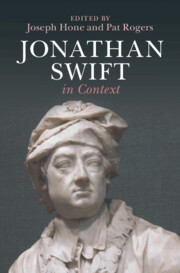Book contents
- Jonathan Swift in Context
- Jonathan Swift in Context
- Copyright page
- Contents
- Notes on Contributors
- Preface
- Acknowledgements
- Chronology
- Abbreviations
- Part I Personal
- Part II Publishing History and Legacy
- Part III Literary Background
- Part IV Genres
- Part V The External World
- Part VI Social and Intellectual Topics
- Chapter 35 Philosophy
- Chapter 36 Science
- Chapter 37 Race
- Chapter 38 Material Culture
- Chapter 39 Gender
- Chapter 40 Colonialism
- Chapter 41 The Body
- Chapter 42 Demography
- Chapter 43 Food
- Chapter 44 Economics
- Further Reading
- Index
Chapter 36 - Science
from Part VI - Social and Intellectual Topics
Published online by Cambridge University Press: 02 May 2024
- Jonathan Swift in Context
- Jonathan Swift in Context
- Copyright page
- Contents
- Notes on Contributors
- Preface
- Acknowledgements
- Chronology
- Abbreviations
- Part I Personal
- Part II Publishing History and Legacy
- Part III Literary Background
- Part IV Genres
- Part V The External World
- Part VI Social and Intellectual Topics
- Chapter 35 Philosophy
- Chapter 36 Science
- Chapter 37 Race
- Chapter 38 Material Culture
- Chapter 39 Gender
- Chapter 40 Colonialism
- Chapter 41 The Body
- Chapter 42 Demography
- Chapter 43 Food
- Chapter 44 Economics
- Further Reading
- Index
Summary
Swift was not the first satirist and parodist to explore science and its texts and technologies, but his works demonstrated an acute sophistication in how they assimilated and imaginatively transformed natural knowledge, as often a vehicle as a target of satire, and with a recognition of science’s increasing cultural power. The first section of this chapter reconstructs the sources and systems that influenced Swift’s allusions to contemporary science, and how they shaped his early prose. The second section looks at the influence of the Royal Society’s Philosophical Transactions and other scientific and ethnographic writings on the third voyage of Gulliver’s Travels.
Keywords
Information
- Type
- Chapter
- Information
- Jonathan Swift in Context , pp. 287 - 294Publisher: Cambridge University PressPrint publication year: 2024
